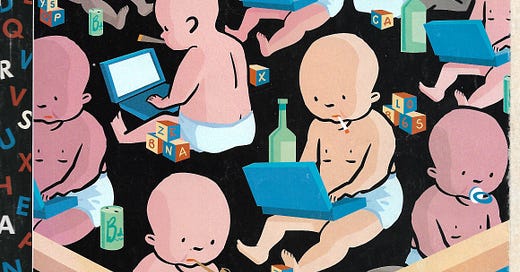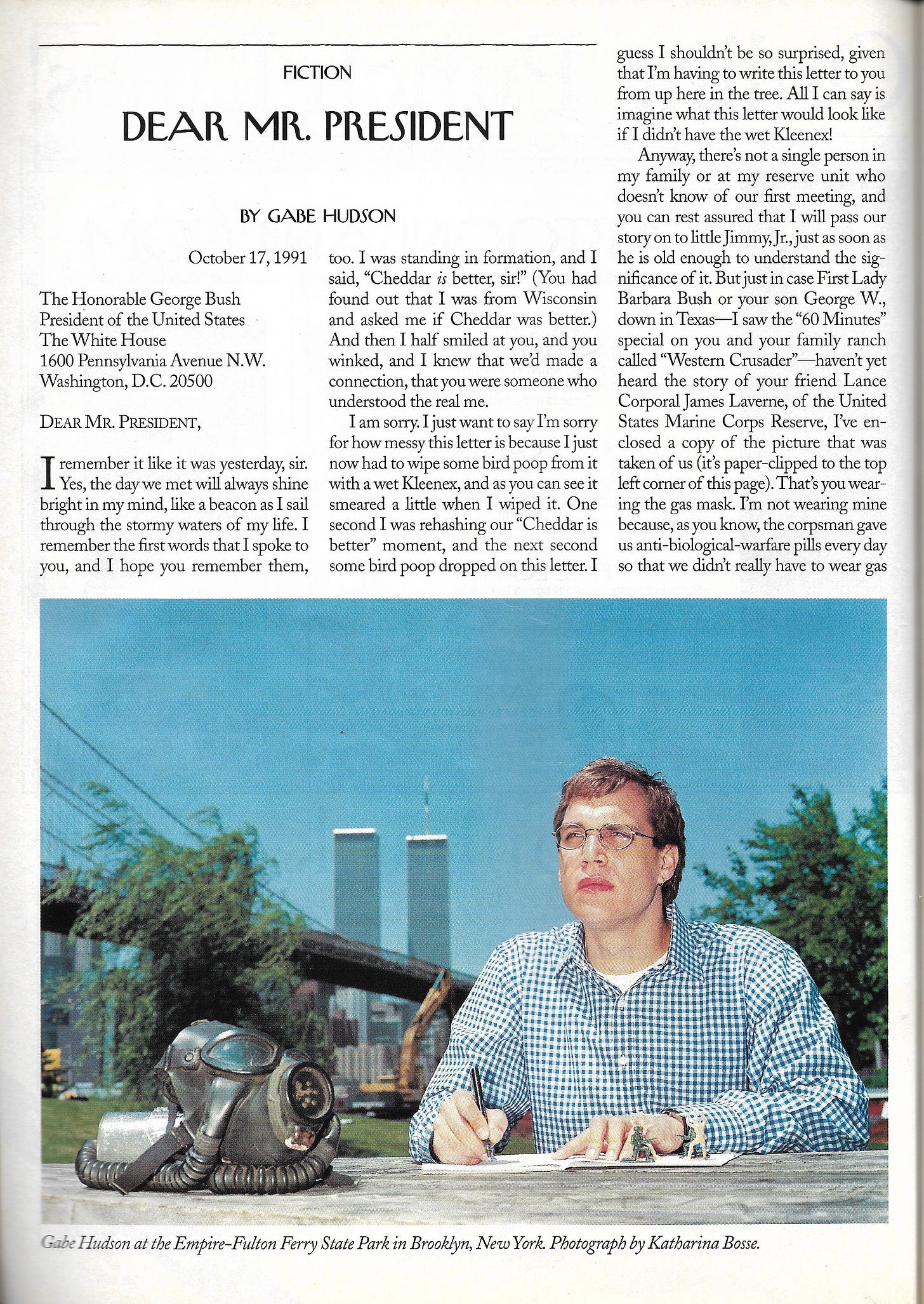History Repeats the Old Conceits
A brief look back at Gabe Hudson's eerily timed debut short story in a 2001 issue of the New Yorker.
Author Gabe Hudson’s recent death has had more of an emotional impact on me than I could have anticipated.
I’ve been left reeling by the suddenness, the surprise, the lack of information. Right after he died some weird obituaries appeared which seemed as if they were written by artificial intelligence. They were filled with conflicting biographical details and claims about how he died. According to a statement from his family, though, the date and cause of death have not been determined. Of course, it’s none of my goddamned business what happened. But tell that to my anxious, grieving brain, which is left wondering “Why??” and searching for answers.
When new obituaries and tributes stopped showing up in Google results, I found something else to fill this new void in my life: I ordered from a seller on eBay a copy of the July 18 & 25, 2001 issue of The New Yorker, the Summer Fiction issue, in which Gabe published his debut short story, “Dear Mr. President,” bearing the same title as his story collection, which would land the following year.
(Don’t think I didn’t try reading it in the digital archives on the New Yorker site. It was pretty much impossible. That site…it’s the absolute worst.)
As the title suggests, it’s an epistolary piece, a letter from a veteran of the first Gulf War—a former rifleman in the Marines, as Gabe had been—dated October 17, 1991, and addressed to George H.W. Bush, a.k.a. “Bush 1.” It touches on some of the horrors of that war for civilians and American soldiers alike, and the after-effects on a veteran’s life back home.
In a comically deferential tone, the letter’s author, Lance Corporal James Laverne, reports he has been left by his wife after she discovered an extra ear had mysteriously appeared on his abdomen while overseas, the result of exposure to Saddam Hussein’s chemical warfare. After cheerfully reminding Bush Sr. of a time they met at the beginning of the war, Corporal Laverne petitions the president to write a letter on his behalf to Mrs. Lavern, suggesting she return to her husband, along with their son.
The piece is dark, funny, subversively irreverent. Like Gabe.
***
When the magazine arrived the other day, I tore the package open. Turning to page 100, where the story begins, I found it arresting to take in the accompanying photo by Katharine Bosse: Gabe at the Empire-Fulton Ferry State Park in Brooklyn, with the World Trade Center’s Twin Towers across the river behind him.
It made me pause and do the math—this story was published seven months into George W. Bush’s (“Bush 2’s” ) ill-begotten first term as president; nearly two months before the attacks on 9/11 that would of course destroy the towers; roughly twenty months before “Dubya” would launch the sequel to his father’s war, not only repeating some of Senior’s hubristic mistakes, but setting new records for casualties and stupidity—for example, attacking the wrong country and dictator, as retribution for 9/11.
My god, the eerie timing of the publication of this document. What a testament to how little humans, or at least our leaders, actually learn from history. How surreal to take this in now, when the United States is funding Netanyahu’s assault on Gaza, a horror show with an unprecedented and mounting civilian death toll. (How do we not know better?) When authoritarians are increasingly grabbing power around the world, and threatening to do so in this country. When literal Nazis and white supremacists are being normalized right here on this platform.
How demoralizing. How stupid we are as a species.
On second reading, though, while considering this context, I thought: Gabe probably really appreciated the irony. I can imagine him making some devastating joke about it, then bellowing a laugh in his deep baritone. I wish I could ring him up and ask him about it.
***
A few other thoughts on this New Yorker issue…
I’m glad I ordered it, not only for Gabe’s story, but for the look back at that time.
It was fun to remember reading other pieces in the issue when it was first published, specifically Nell Freudenberger’s and Jonathan Safran Foer’s debut short stories. I recall liking both, especially Foer’s, an excerpt of his first novel, Everything is Illuminated. I know that among a certain set it’s not cool to like his work, but I really enjoyed that book when it came out in 2002. (On my maternal grandfather’s side I come from Ukrainian shtetl stock, and I guess that has something to do with why it intrigued me, and resonated. I haven’t revisited it to know whether it holds up for me.)
It’s a pretty thick issue, 174 pages. There are a lot more ads than you see in current editions—I’m guessing most advertising has moved to the website. There’s an L.L. Bean advertisement with a corded landline and a wired mouse to illustrate that you can order from them over the phone or, miracle of miracles, over the internet.
This week I’ve thought a lot about where I was in my life in the summer of 2001—just back from a year living in Rhinebeck while I sublet my East Village tenement…recovering from a really bad breakup… scrambling to find freelance assignments. It was a rotten time for me. It feels good to realize what a better place I’m in now.
All in all, the magazine has been an interesting time capsule to flip through. How many things were different. How many we sadly keep repeating.






Thanks Sari for asking the thought-provoking (and introspective) questions. Among other things, it made me think back to what 2001 meant to me.
I survived the worst layoff of the company I joined just a few months earlier—the one I resigned/retired from last year—had ever conducted, and bought a ticket on an early morning United flight from Newark to San Francisco on September 11th only to change it to a later flight because I thought the flight was too early and it was free to make same-day change ... The rest is history, and, fate.
Reading your essay made me think about what has happened since then, what I have been doing to deserve that second chance, and what it should mean to this current (and next?) phase of my life.
I didn't know him, but I, too, found the obits weird, and stopped reading them. It was enough to know my friends had lost someone they loved. I'm so sorry.
And you know how I feel about Rhinebeck, so you can imagine how I feel for past you, being there at such a hard time in your life. Love you.
xoc